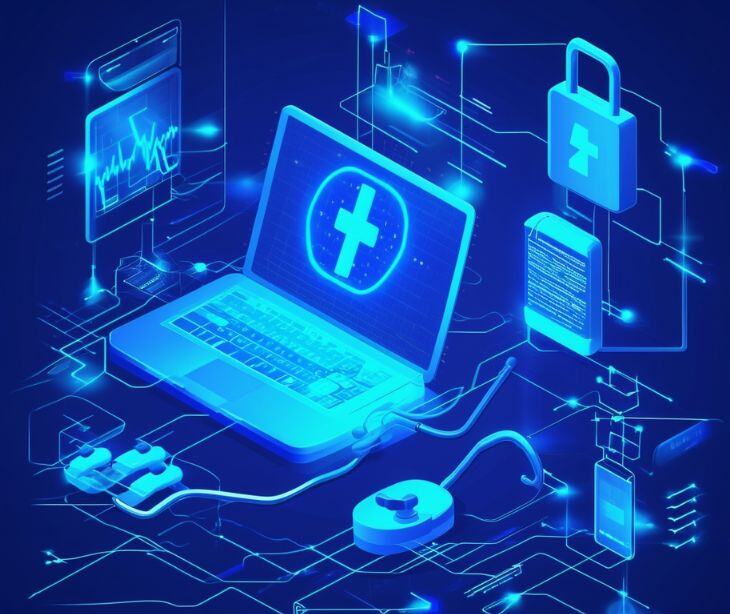
Cybersecurity policies cover data protection, system security, employee training, incident response, and more. Sharing these policies ensures employees understand guidelines on data access, password security, incident reporting, and acceptable technology use, empowering them to contribute to a secure work environment.
Understanding healthcare cybersecurity
According to a study on Healthcare Data Breaches: Insights and Implications, “E-health data is highly susceptible, as it is targeted most frequently by attackers. A long-term analysis of data breaches showed that healthcare records were exposed by both internal and external attacks, such as hacking, theft/loss, unauthentic internal disclosure, and the improper disposal of unnecessary but sensitive data.”.
In healthcare, cybersecurity is the protector of patient privacy and data integrity. It involves protecting electronic health records (EHRs), medical devices, and sensitive information from cyber threats. It upholds patient confidentiality, prevents data breaches that could jeopardize care, and maintains trust between healthcare providers and patients.
Read more: What is cybersecurity in healthcare?
The role of cybersecurity policies in healthcare
Cybersecurity policies in healthcare can be the guiding light for employees, creating a clear path toward secure digital practices within medical environments. Their purpose is to safeguard patient records, protect medical devices, and shield sensitive data, forming the backbone of a secure healthcare infrastructure.
Why educating healthcare employees on cybersecurity policies matters
From nurses to administrators, each individual’s actions impact patient confidentiality and organizational integrity. Educating healthcare professionals about cybersecurity policies empowers them to become vigilant guardians of patient information.
That involves comprehensive training sessions tailored to healthcare-specific scenarios, which illuminate potential risks and instill a deep understanding of the importance of adhering to cybersecurity protocols. Regular awareness campaigns, workshops, and simulated phishing exercises cultivate proactive security among staff members.
Essential elements of healthcare cybersecurity policies
Data protection in healthcare
Protected health information (PHI) cybersecurity lies in selective data collection and stringent controls over its access. Policies stress minimal data collection, limiting the information gathered to only what’s necessary for patient care. With access controls and encryption protocols, patient records remain guarded against unauthorized access even in the event of a breach.
Securing healthcare systems
Cybersecurity policies mandate robust password policies, regular updates, and multi-factor authentication for accessing critical systems. Network security measures, including firewalls and intrusion detection systems, create barriers against potential cyber threats targeting medical devices and sensitive healthcare data.
Employee training and awareness in healthcare
Healthcare-specific cybersecurity best practices, incident reporting procedures, and acceptable technology use policies are imparted through regular training sessions. Staff members are equipped to promptly identify and report potential security threats, mitigating risks before they escalate.
Response and recovery plans for healthcare
Tailored incident response strategies must outline clear steps to swiftly identify, contain, and mitigate security breaches. Regularly tested backup and recovery procedures ensure prompt data restoration in case of security incidents, minimizing downtime and potential data loss.
Engaging healthcare employees in cybersecurity policies
Effective communication strategies bridge the gap between policy creation and implementation, promoting active involvement and compliance across all levels of the healthcare organization. Regular communication through HIPAA compliant email, interactive workshops, and clear policy documentation ensure cybersecurity measures are ingrained in daily workflows.
Advantages of adhering to healthcare cybersecurity policies
Adhering to these policies mitigates the risks of data breaches and bolsters patient confidentiality, building trust among patients, regulatory bodies, and healthcare partners. Compliance with healthcare regulations, such as HIPAA, is a natural outcome of these measures.
FAQs
How can healthcare organizations minimize the risk of insider threats?
Implementing strict access controls and monitoring user activity can help detect and prevent unauthorized actions by employees or internal users.
What role do cybersecurity audits play in healthcare?
Regular cybersecurity audits help identify vulnerabilities in systems and ensure that healthcare organizations remain compliant with security standards like HIPAA.
How does cybersecurity contribute to patient trust in healthcare?
Effective cybersecurity safeguards patient information, ensuring that their private health data is protected, which reinforces trust in healthcare providers and their commitment to privacy.
Subscribe to Paubox Weekly
Every Friday we bring you the most important news from Paubox. Our aim is to make you smarter, faster.




